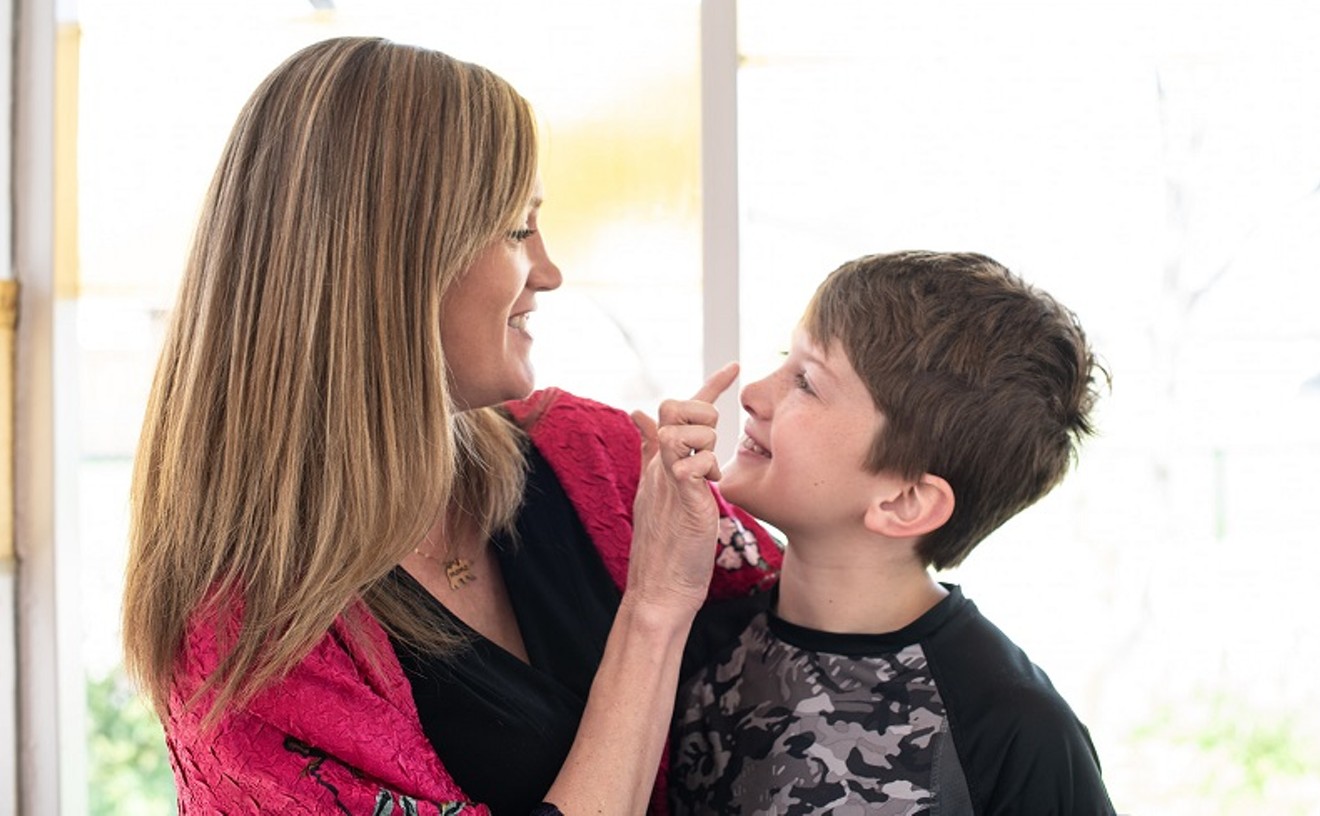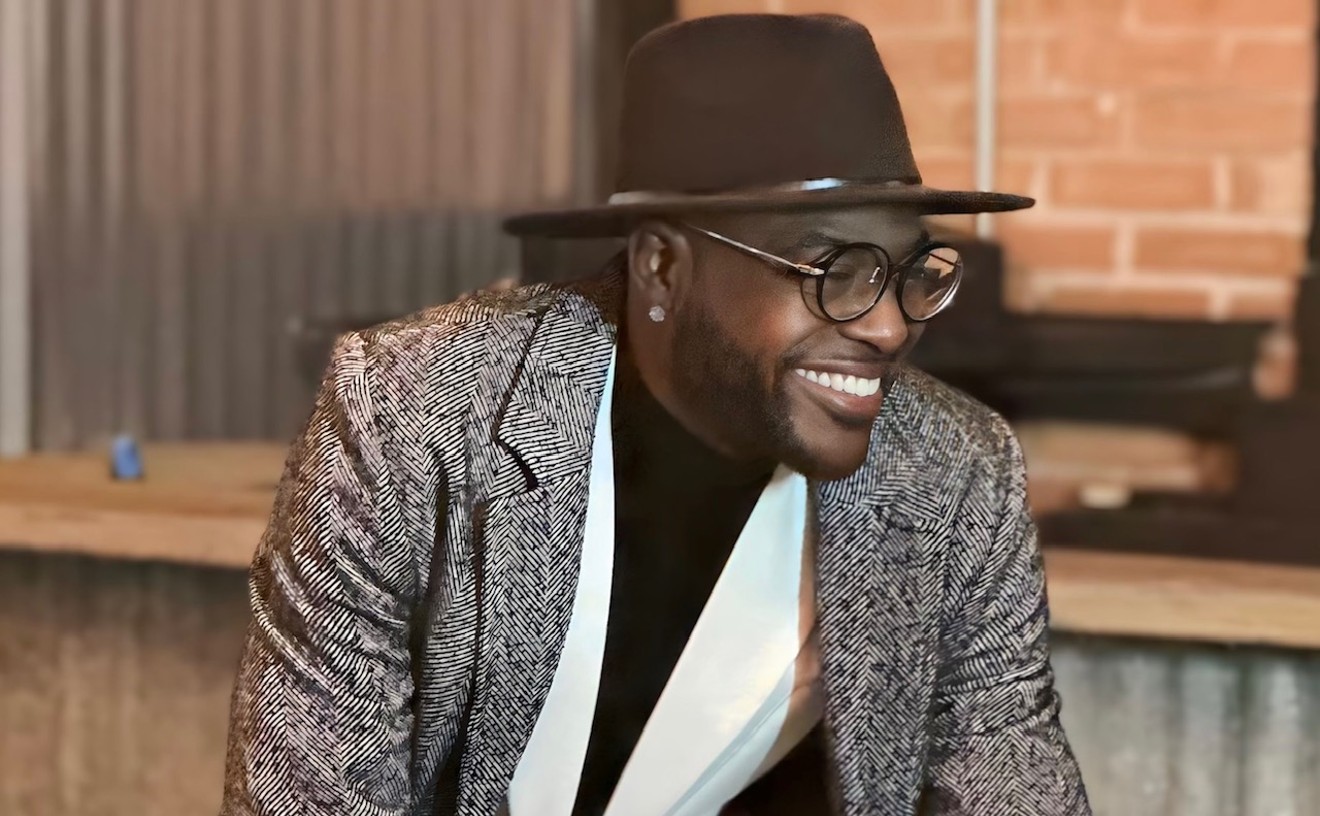Knowing some of the history of Hair and how radical and unsettling a piece of musical theater it was in its time makes watching Uptown Players' ecstatic and provocative production even more meaningful. How easy it would be to package this show as a quaint and cutesy wink at the Age of Aquarius, like an American Idol tribute to the tunes of yesteryear. Director Cheryl Denson doesn't do that at all. She's kept her interpretation smart and true to the period Hair was born in, but she gives it fresh resonance. Watch that upstage screen for the constantly shifting projected images (designed by Chris Robinson). Gradually, Vietnam becomes Iraq. LBJ morphs into GWB. And we become aware that state-of-the-world-wise, it's déjà vu all over again.
Hair makes big and often deeply cynical statements about politics, religion, sex and drugs. Broadway musicals weren't supposed to go there in the 1960s. Some still don't dare (cough, Mamma Mia!). Hair also comes with full-frontal nudity (look quick or you'll miss it), simulated drug use, a hymn to sodomy (with a wistful reminder that Mick Jagger wasn't always the "wrinkly rocker") and flagrant use of the N-word and other verbs, nouns and adjectives that still aren't polite to say in public unless you're the star of your own cable comedy special.
Doing theatrically what nobody had done before was what Hair was all about. The show grew out of an acting workshop, debuting in 1967 as the inaugural production at the brand-new Joseph Papp Public Theatre in Lower Manhattan. It moved to a discotheque called the Cheetah before being extensively reworked for Broadway (with Diane Keaton in a small role) in 1968. It did boffo business, despite mixed reviews, drawing an audience profile producers hadn't seen before. Lined up around the block were young hipsters from uptown and down who wouldn't be caught dead at Plaza Suite or Promises, Promises. Nothing else so sexy, raucous and freewheeling was lighting up the Great White Way at the time. Many imitators would follow (naked bods became de rigueur for several seasons), but there wouldn't be anything close to Hair in popularity with young theatergoers until Rent came along in 1996.
Hard to believe, watching it at Uptown's tiny Trinity River Arts Center, that a musical that aspired to offend and was held up as a threat to the moral fiber of America's youth and an example of the decline of Western civilization would, 40 years on, seem so sweet and tuneful. Composed by Galt MacDermot and billed originally as a "tribal love-rock musical," now it sounds about as hard-driving and out-there musically as the ballads of James Taylor (the 1960s' version of John Mayer). It's downright innocent, too, in depicting the simple hopes and desires of young adults of that period. All they want is to stop the war, clean up air pollution, fall in love and get along with their folks. This upset the status quo?
The story—and there's only a scant suggestion of one in the book by Gerome Ragni and James Rado, who also wrote the lyrics—presents a commune of gentle dropper-outers loitering in a Greenwich Village park.
Claude, a bright, sensitive kid (played by Sean Patrick Henry), is about to be drafted into the Army and shipped off to Vietnam. The first act introduces each member of his "tribe." The second plays out Claude's acid-induced nightmare revisiting key moments in American history, including a doo-wop version of the Gettysburg Address sung by a black chick in Abe Lincoln drag. Trippy.
By day the merry longhairs protest the war and panhandle for change. By night they roll up joints and roll around with each other. They also sing and dance a lot, much like those cleaner-cut gangs in West Side Story, which takes place 10 years earlier and about 100 blocks north of where the Hair crowd hangs out.
Dancing is a big part of the show. At Uptown, the choreography by Vicki Squires recalls the loose-limbed, sensuous moves of Twyla Tharp, who created the dance sequences for Milos Forman's bad 1979 movie version of Hair (starring a too-old Treat Williams). Squires concentrates on stirring up undulating torsos and wavy arms, with the occasional frug or pony step thrown in for fun. The ethnically diverse cast of 21 (many of them under 21) features some hot dancers, including Henry (who's also a fine singer), Tyler Donahue (playing several roles), Chad Peterson (as Woof), Carrie Slaughter (Crissy) and Crystal Hannah (Dionne). Dig how they shimmy in those tie-dyed dashikis by costumer Robin Armstrong.
The cast members, some appearing in their first professional show, nail it all vocally too. As the American theater's first popular sung-through musical, Hair is a demanding mini-opera that holds the record for the most chart hits from a Broadway show. Among them: "Age of Aquarius/Let the Sunshine In," recorded first by Little Anthony, then made an even bigger hit by the 5th Dimension; "I Got Life," covered by Nina Simone; "Where Do I Go" by Carla Thomas; "Hair" by the Cowsills; "Easy to Be Hard" by Three Dog Night; and "Good Morning Starshine" by Oliver. Hair saw more than 700 recordings made from the score by 1970 (the show ran on Broadway until 1972). The Broadway cast album hit No. 1 and won a Grammy.
No Tonys for Hair, however. That year's committee of blue-hairs rejiggered the rules to keep the show from being nominated. The Neil Simon/Burt Bacharach/Hal David musical Promises, Promises, a safer choice, took home the prizes instead.
Hair may be twice as old as the actors performing in it now, but it's held up better than most shows its age. (Like, who's seen The Happy Time recently?) MacDermot's music has proven its staying power with endless reuses in films and on TV commercials. William Shatner crooned "Age of Aquarius" for a Priceline spot just recently. The title song has sold shampoo. "Let the Sunshine In" was a natural for window cleaner. And if the pharmaceutical peddlers haven't secured the rights to "Easy to Be Hard" for Cialis, they ought to immediately.
For some of us of a certain hoary age, Hair throbs with the anthems of our youth, glibby-glop-gloopies notwithstanding. Seeing a stage crowded with talented, soft-cheeked kids throwing their frizzed-out manes back, singing about "Harmony and understanding/Sympathy and trust abounding"...garsh, it reminds us who we once were and who we once wanted to be. In that way, Hair's a musical magical time machine transporting us back to a place where we were free to dream, where the moon was in the seventh house and we thought peace would guide the planets and love would steer the stars. But really, what the hell did we know?










